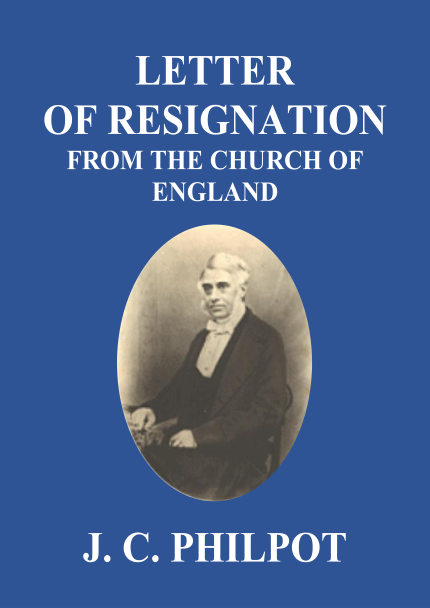By Joseph Charles Philpot.

J.C. Philpot’s Letter of Resignation from the Church of England.
By Joseph Charles Philpot.
About the Author Joseph Charles Philpot:
Joseph Charles Philpot (1802-1869) was an English preacher and writer who played an important role in the development of the Strict Baptist movement in the 19th century.
Philpot was born in Ripple, Kent, England, and was educated at Oxford University. He became a minister in the Church of England in 1825 but later became dissatisfied with its teachings and joined the Strict Baptists in 1835. He soon became a prominent preacher in this movement and was widely regarded as one of its leading figures.
J.C. Philpot’s left the Church of England:
Joseph Charles Philpot left the Church of England in the mid-1830s due to his growing dissatisfaction with what he perceived as the Church’s increasing departure from its historic roots and doctrinal purity. Philpot had initially been ordained as an Anglican minister and had served as a curate in various parishes. However, he became increasingly disenchanted with the Church of England’s emphasis on tradition and ceremony over biblical truth and the Gospel message.
About J.C. Philpot’s Letter of Resignatiion from the Church of England:
In his letter of resignation from the Church of England, which was published in The Gospel Standard in 1835, Philpot expressed his reasons for leaving the Church. He wrote that he had come to believe that the Church of England was no longer a faithful witness to the truth of the Gospel and that it had become “a mere human institution, instead of being a spiritual society, built upon the foundation of the apostles and prophets, Jesus Christ himself being the chief corner-stone.”
Philpot also expressed his conviction that the Church of England had departed from its biblical roots and had embraced “superstitious practices and unscriptural doctrines.” He argued that the Church’s emphasis on ritualism and external forms of worship had led to a neglect of the true spiritual needs of the people.
In his letter, Philpot made it clear that his decision to leave the Church of England was not taken lightly, but was the result of much prayer and careful consideration. He expressed his desire to continue to preach the Gospel and to be faithful to the truth of God’s Word, even if it meant being outside of the Church of England.
Overall, Philpot’s resignation from the Church of England reflected his deep commitment to biblical truth and his conviction that the Church of England had strayed from its historic roots and doctrinal purity.